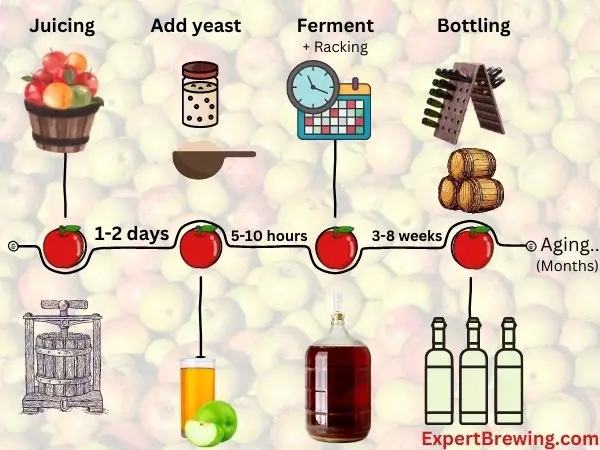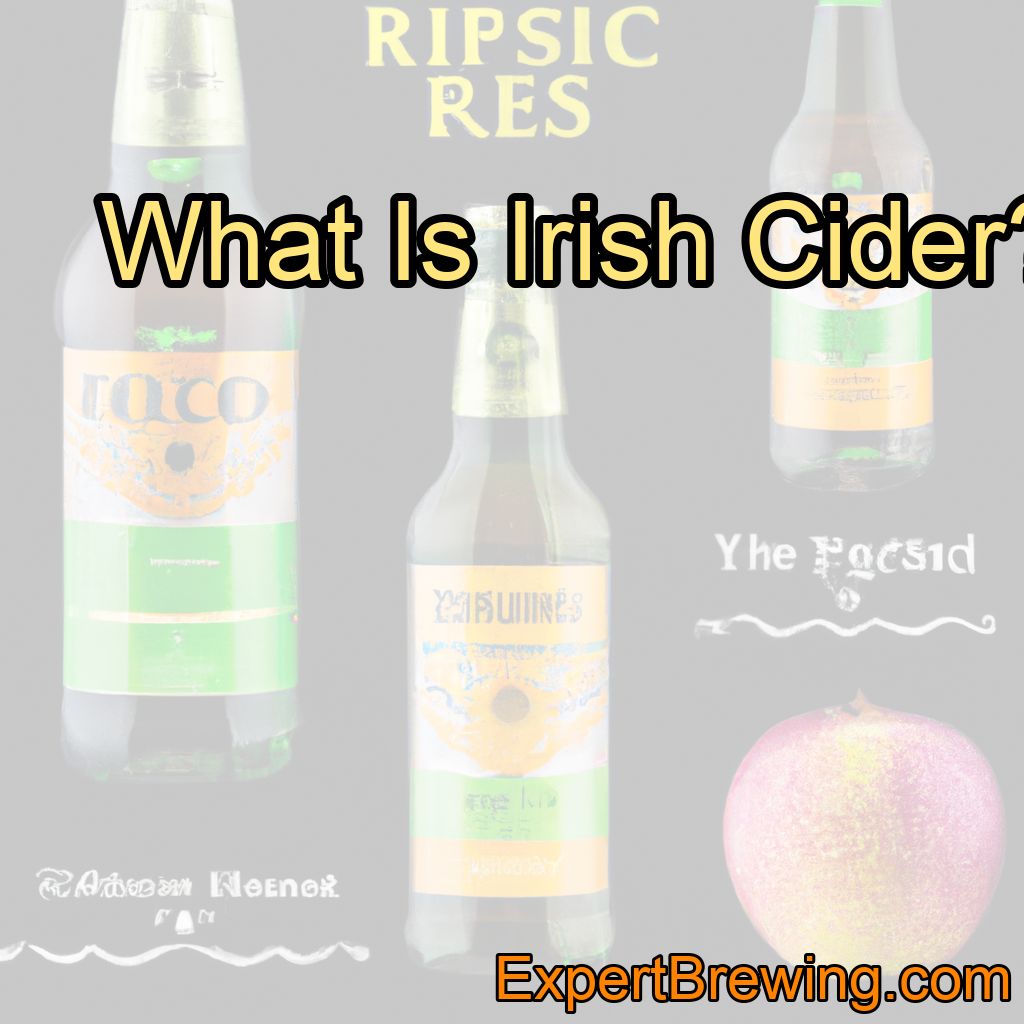Cider is a popular drink across the globe, but few places have as rich an association with the beverage as Ireland.
So, what is Irish cider? Simply put, Irish cider, also known as hard cider, is an alcoholic beverage made from fermented apple juice after Irish traditions.
It’s a drink steeped in history and tradition, and is as much a part of Irish culture as Guinness, potatoes, and folk music.
In this blog post, we will delve deep into the world of Irish cider, its history, the process of making it, and why it holds such a special place in the hearts of the Irish people.
The History of Irish Cider
Irish cider has a history dating back to ancient times. The Celts, who inhabited Ireland before the arrival of the Christians, were known to have produced cider from apples.

The Christian monks, who arrived in Ireland around the 7th century, continued this tradition and refined the process. They introduced the practice of fermenting apple juice, which led to the creation of what we now know as hard cider.
In the 18th century, with the Industrial Revolution, cider production became more systematic and widespread. The introduction of the cider press made it easier to extract juice from apples, leading to an increase in cider production.
Despite the ups and downs faced by the industry, including the impact of the temperance movement and the prohibition era, Irish cider has remained a beloved drink in Ireland and beyond.
The Apple Varieties Used in Irish Cider
The types of apples used in making cider significantly influence its taste. In Ireland, there are several apple varieties used, including Dabinett, Michelin, Yarlington Mill, and Kingston Black. These are all traditional cider apple varieties known for their high sugar content and the rich, tangy flavors they impart to the cider.
The Process of Making Irish Cider
The process of making Irish cider is a craft that requires skill, patience, and a deep understanding of the ingredients and fermentation process. The first step is the harvesting of apples, which is done in the autumn.
The apples are then washed and crushed in a cider press to extract the juice. The juice is then placed in a fermentation tank, where it is left to ferment for several weeks or months.

During fermentation, the natural sugars in the apple juice are converted into alcohol by yeast. Once the fermentation process is complete, the cider is filtered and, in some cases, carbonated before it is bottled.
Some cider makers also age their cider for several months or years to enhance the flavors.
The Taste of Irish Cider
Irish cider is known for its complex and varied taste. The flavor can range from dry to sweet, with notes of apple, pear, honey, and spices. The taste can also vary depending on the type of apples used and the fermentation process. Some ciders are very crisp and refreshing, while others are more robust and full-bodied.
The Cultural Importance of Irish Cider
Cider holds a special place in Irish culture. It is a drink that is associated with joyous occasions and gatherings.

From weddings to Christmas celebrations, cider is often the drink of choice. It is also a symbol of Irish heritage and tradition, and is often used in cooking to add a unique flavor to dishes.
Irish Cider Brands
There are many brands of Irish cider available, each with its unique taste and character. Some of the most popular brands include Bulmers (known as Magners outside Ireland), Orchard Thieves, Craigies, Longueville House, and Stonewell. These brands are known for their high-quality cider and their commitment to preserving the traditional methods of cider making.
- Bulmers (Magners outside of Ireland): One of the most famous Irish cider brands, Bulmers is known for its smooth and refreshing taste. It is made from a blend of apples, including dessert and culinary varieties, giving it a balanced and slightly sweet flavor. Bulmers is typically served over ice, which enhances its crispness.
- Orchard Thieves: Produced by Heineken Ireland, Orchard Thieves is a popular cider that aims to appeal to a younger audience. It offers a slightly sweeter taste compared to traditional ciders and is often seen as a modern and more adventurous choice.
- Longueville House Cider: This brand focuses on using traditional cider apple varieties, which results in a more complex and robust flavor profile. Longueville House Cider is aged in oak barrels, adding depth to the taste and making it a favorite among cider enthusiasts.
- Stonewell Cider: Produced in County Cork, Stonewell Cider is known for its authentic, artisanal approach to cider-making. They use a blend of cider apples sourced locally, creating a crisp, dry cider with a distinctive character.
- Mac Ivors Cider: Hailing from County Armagh, Mac Ivors Cider is crafted using a blend of traditional apple varieties, providing a balance of sweetness and acidity. It has a crisp and refreshing taste with fruity notes.
- Dan Kelly’s Cider: Produced in County Meath, Dan Kelly’s Cider is made from handpicked apples grown in their own orchards. The cider is fermented slowly to enhance its flavors, resulting in a well-balanced and aromatic beverage.
- Craigies Cider: Made from a mix of dessert and cider apples, Craigies Cider delivers a subtle sweetness with a dry finish. It is crafted in County Wicklow with a commitment to sustainability and using traditional methods.
Conclusion
In conclusion, Irish cider is a drink that is rich in history, tradition, and flavor. It is a beverage that is deeply rooted in the Irish culture and is enjoyed by people of all ages. Whether you prefer a dry, crisp cider or a sweet, full-bodied one, there is an Irish cider to suit every palate.
To summarize, here are 10 facts about Irish cider:
1. Irish cider is an alcoholic beverage made from fermented apple juice.
2. It has a history dating back to ancient times.
3. The Christian monks refined the process of cider making in Ireland.
4. Several apple varieties are used in making Irish cider, including Dabinett, Michelin, Yarlington Mill, and Kingston Black.
5. The taste of Irish cider can range from dry to sweet, with notes of apple, pear, honey, and spices.
6. Cider holds a special place in Irish culture and is associated with joyous occasions and gatherings.
7. Many brands of Irish cider are available, each with its unique taste and character.
8. Some popular Irish cider brands include Bulmers, Orchard Thieves, Craigies, Longueville House, and Stonewell.
9. Irish cider is often used in cooking to add a unique flavor to dishes.
10. The cider making process is a craft that requires skill, patience, and a deep understanding of the ingredients and fermentation process.
FAQs
What Irish ciders are available in the US?
Some popular Irish ciders available in the US include Bulmers (known as Magners outside of Ireland), Strongbow, and Smithwick’s. These brands can be found in many liquor stores, bars, and restaurants across the country.
What is the most famous Irish cider?
The most famous Irish cider is probably Bulmers, which is known as Magners outside of Ireland. It has gained international recognition for its refreshing taste and is widely enjoyed both in Ireland and abroad.
What cider comes from Ireland?
Ireland is known for producing a variety of ciders, with some popular brands including Bulmers (known as Magners outside of Ireland), Orchard Thieves, and Stonewell. These ciders are made using traditional and modern methods, often using locally sourced apples to create a range of flavors and styles.
How much alcohol is in cider in Ireland?
In Ireland, the alcohol content in cider typically ranges from 4.5% to 6% ABV (alcohol by volume).
Does Irish cider have alcohol?
Yes, Irish cider typically contains alcohol. Cider is an alcoholic beverage made from fermented apple juice. Irish ciders are known for their crisp and refreshing taste, and they usually have an alcohol content ranging from 4% to 6% ABV (alcohol by volume).
How much alcohol is in Irish cider?
Irish cider typically contains an alcohol content ranging from 4% to 6% ABV (alcohol by volume).





